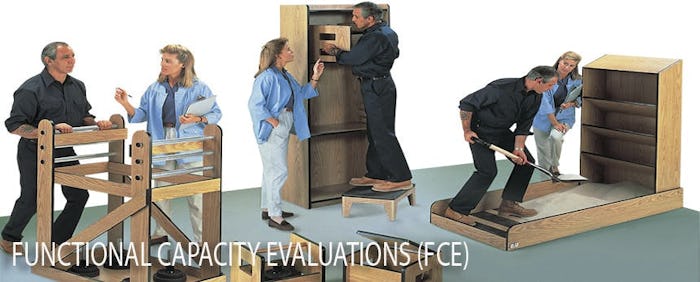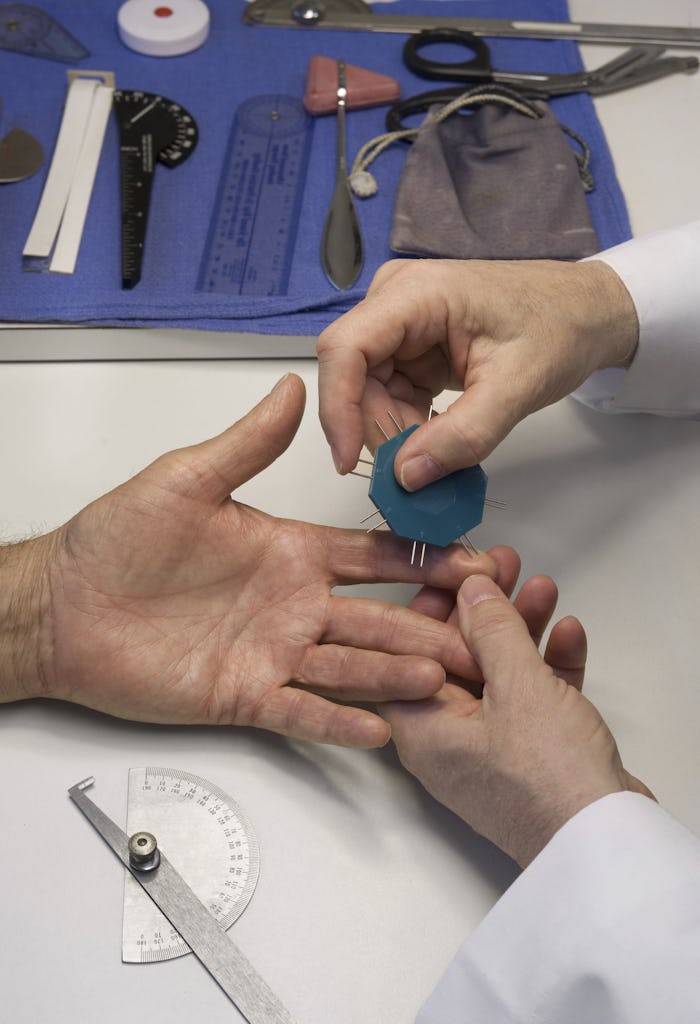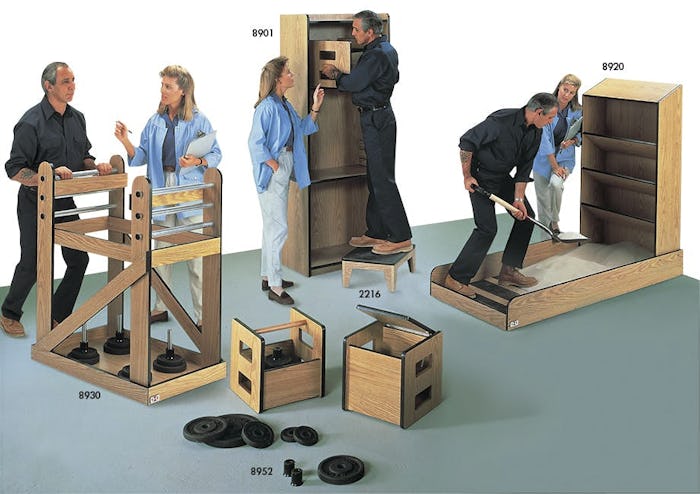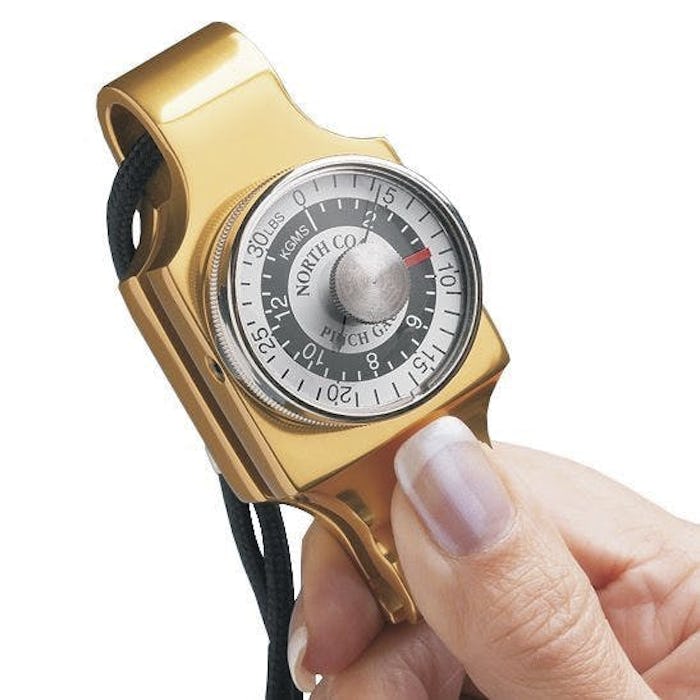Functional Capacity Evaluations are used for a variety of reasons. One can use an FCE to measure the physical abilities of patients before and after a rehabilitation program, to modify a rehabilitation treatment, to evaluate whether an injured worker can work, and to determine when an individual can return to work.

Our Functional Capacity Evaluation is based on the Dictionary of Occupational Titles-Residual Functional Capacity (DOT-RFC) Battery.1,2 The Dictionary of Occupational Titles (DOT) defines numerous job-related tasks and categorizes occupations into one of five progressively increasing strength classifications (sedentary, light, medium, heavy and very heavy).3
The DOT-RFC Battery tests over 30 different job-related tasks (such as climbing, balancing, stooping, crouching, crawling, walking, kneeling, etc.) that an individual may be required to perform for any given occupation. The Battery measures an individual’s residual functional capacity (performance level attained for each job related task tested) based on peer reviewed norms called the Demand Minimum Functional Capacity (DMFC). The DMFC is the minimal acceptable level of performance for each job-related tasks or factors that a person must achieve before being able to safely and dependably return to work. In other words, the DMFC for each job-related task tested along with the strength classification of a given occupation must be obtained in order for an individual to return to a particular occupation in a safe and dependable manner. The DOT-RFC Battery was created to measure the medical impairment of a person, express it in terms of functional limitations, and ultimately calculate the person’s actual work capacity.1


The DOT-RFC Battery was found to demonstrate: 5-6
- Excellent Face and Construct Validity
- Strong Content Validity
- Good Test/Re-Test Reliability
- Good Intra-Rater Reliability
- Strong Content Validity
- job-related tasks have been shown to demonstrate predictive validity in the real work world.2
TYPES OF FCE TESTING:

- Job Specific Functional Capacity Evaluation: Generally take about 3-6 hours
- Basic (Non Job Specific) Functional Capacity Evaluation: Generally take about 3-6 hours
- Disability Determination Functional Capacity Evaluation: Generally take about 3-6 hours
- Return to Work Functional Capacity Evaluation Generally take about 3-6 hours
- One Day Functional Capacity Evaluation: Generally take about 3-6 hours
- Multi-Day Functional Capacity Evaluation: Generally take about 3-6 hours over several days
- Pre and Post Employment Testing: Generally take about 30 minutes
- Job Placement and Job Transfer Testing: Generally take about 30 minutes
- Fitness for duty Testing: Generally take about 30 minutes
- Physical or Job Demand Analysis: Generally take about 2-3 hours
KEY TESTING FEATURES IN OUR FCE:

- Physical Examination
- Sitting, Standing and walking tolerances
- Material Handling/Strength testing (lifting, carrying, pushing, pulling)
- Balance (Static, Dynamic) & Sensory Testing
- Functional testing (stairs, ladders, stooping, kneeling, crouching, crawling, reaching, etc.)
- Work Simulation tolerances
- Gross/Fine motor testing including key, chuck, and key pinch testing
- Standardized testing (Grip, Box and Block, Minnesota, Purdue, Moberg, etc.)
- Cardio-respiratory Fitness testing (arm crank, astrand, step test, bike/ergometer, 6 minute walk, etc.)
- Full time work tolerance testing (see if your patient can work a full 8 hour day)
- Pain/Outcome Questionnaires (Oswestry, neck disability, DASH, LEFS, McGill pain, Beck depression, Fatigue, etc.)
- Consistency of Effort (Observation, rapid grip, 5 point “bell shape” grip, coefficient of variation grip, Epic heart rate, dynamic heart rate, Hoover, Waddell, Borg, horizontal strength change, credibility assessment tool, & performance APGAR).
- Comparing Occupations against the Dictionary of Occupational Titles (DOT).

CERTIFIED EVALUATORS
- Licensed Physical Therapists
- Certified, Fishbain Dictionary of Occupational Titles-Residual Functional Capacity Battery
- Certified, Pre-Placement Screenings/Functional Capacity Evaluations, Advanced Ergonomics
- Certified, Trainer in Pre-Placement Screenings, Advanced Ergonomics
REFERENCES

- Fishbain DA, et al. Measuring residual functional capacity in chronic low back pain patients based on the Dictionary of Occupational Titles, SPINE 1994;19(8)872-880.
- Fishbain DA, et al. Validity of the Dictionary of Occupational Titles-Residual Functional Capacity Battery. Clin J Pain 1999;15(2):102-110.
- U.S. Department of Labor, Employment and Training Administration. Dictionary of Occupational Titles, 4th edition: Supplement. Washington, DC: U.S. Government Printing Office, 1986.
- Yeomans SG, Liebenson C. Functional capacity evaluation and chiropractic case management. Top Clin Chiro 1996;3(3):15-25.
- Innes E, Straker L. Validity of work related assessments. WORK 1999;13(2):125-152.
- Innes E, Straker L. Reliability of work related assessments. WORK 1999;13(2):107-124.



